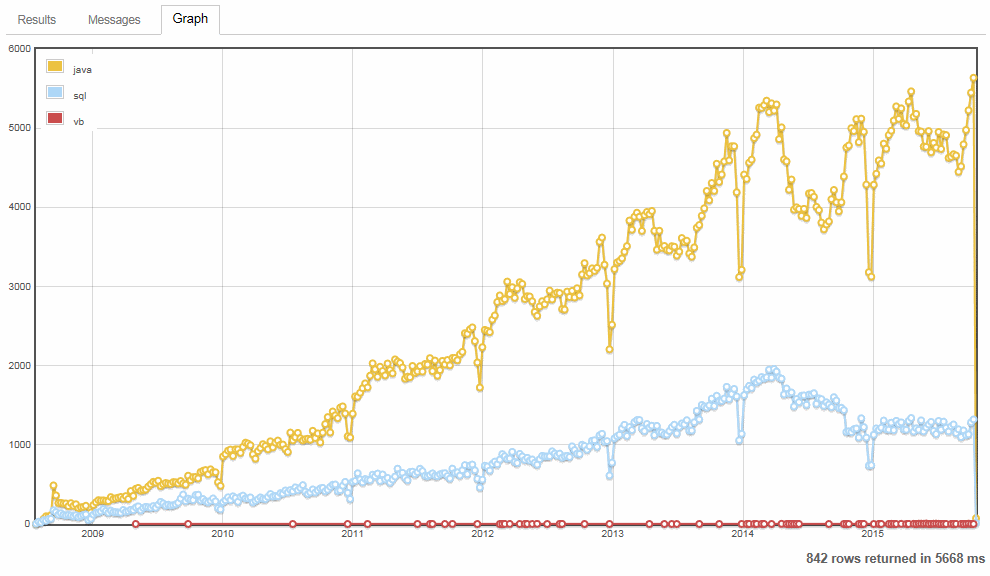Maybe a query like this already exists. I am looking for a query that accepts more than one tag, for example, java, sql and vb, and then tracks their progress over time. It would be useful to see which tags are dwindling and which tags are more popular in SE.
-
Existing query: data.stackexchange.com/stackoverflow/query/90306/…, taken from Graph trends for activity within tags– Martijn PietersCommented Jul 6, 2014 at 11:00
-
You can find several queries here: meta.stackoverflow.com/questions/260570/… - note that none of these work beyond a single site, as tags are always site-specific.– Shog9Commented Jul 8, 2014 at 3:37
1 Answer
The following query shows the number of questions with specific tags across all sites in the SE network.
-- start create url from dbname
IF OBJECT_ID ( '#siteurl', 'P' ) IS NOT NULL
DROP PROCEDURE #siteurl;
GO
create procedure #siteurl
@dbname nvarchar(250),
@res nvarchar(250) OUT
as
begin
-- we have three sites that have borked DNS entries
set @dbname = (case @dbname
when 'StackExchange.Audio' then 'StackExchange.Avp'
when 'StackExchange.Audio.Meta' then 'StackExchange.Avp.Meta'
when 'StackExchange.Mathoverflow.Meta' then 'net.Mathoverflow.meta'
else @dbname
end)
-- and one of those doesn't want to end with .com
if @dbname <> 'net.Mathoverflow.meta'
set @dbname = 'com.' + @dbname
exec #recursesiteurl @dbname, @res OUTPUT
end
GO
-- create url from dbname
IF OBJECT_ID ( '#recursesiteurl', 'P' ) IS NOT NULL
DROP PROCEDURE #recursesiteurl;
GO
create procedure #recursesiteurl
@dbname nvarchar(250),
@res nvarchar(250) OUT
as
begin
declare @pos integer
declare @rec nvarchar(250)
set @res = @dbname
set @pos = CHARINDEX('.', @dbname)
if (@pos > 0 )
begin
set @rec = substring(@dbname, @pos+1, len(@dbname))
exec #recursesiteurl @rec, @rec output
set @res = @rec
+ '.'
+ substring(@dbname, 0, @pos)
end
end;
GO
declare @tag nvarchar(25) = ##tag:string## -- tag1
declare @tag2 nvarchar(25) = ##tag2:string## -- tag2
declare @tag3 nvarchar(25) = ##tag3:string## -- tag3
-- all databases
declare db_c cursor for select [name]
from sys.databases
where database_id > 5 -- skip master, temp, model, msdb, Data.SE
declare @db_c_name sysname -- holds name of db after fetch
declare @sql nvarchar(max) -- holds build up sql string
-- result table
create table #all_tags ( site nvarchar(250)
, creationdate datetime
, tagcount int
, tagname nvarchar(200));
open db_c
fetch next from db_c into @db_c_name
while(@@FETCH_STATUS = 0)
begin
set @sql = N'use '+ QUOTENAME(@db_c_name) +';
declare @url nvarchar(250)
exec #siteurl ''' + @db_c_name + ''', @url output
insert into #all_tags
select @url
, cast(p.creationdate as date)
, count(*) as tagcount
, tagname
from posts p
inner join posttags pt on pt.postid = p.id
inner join tags t on t.id = pt.tagid
where t.tagname in ('''+ @tag + ''','''+ @tag2 + ''','''+ @tag3 + ''')
group by cast(p.creationdate as date)
, t.tagname
;'
exec (@sql)
fetch next from db_c into @db_c_name
end;
close db_c;
deallocate db_c;
select /* replace(
replace(
replace(site,
'.StackExchange.com',''),
'.com',''),
'.net','') as [site]
,*/ dateadd(d, -datepart(dw, creationdate), creationdate)
, tagname
, sum(tagcount)
from #all_tags
group by dateadd(d, -datepart(dw, creationdate), creationdate)
, tagname
order by dateadd(d, -datepart(dw, creationdate), creationdate)
, tagname
drop table #all_tags
drop procedure #recursesiteurl
drop procedure #siteurl
The query doesn't take into account when tags are added later. It simply assumes that the creationdate of the post is also the first time the tag was used. Bringing that logic into the query would probably make it timeout and I doubt if the results would differ very much.
When run with the three example tags you provided the output looks like this:
-
Some nice improvement could be showing some more tags and maybe some automatic classment like top ten tags or better top ten languages will be useful!! SE point of vue about tiobe.com/tiobe-index Commented Feb 20, 2022 at 15:23

